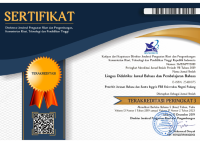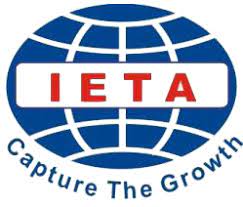An Analysis of Logical Fallacy on Prabowo Subianto's Argumentation during 2019 Indonesia Presidential Debate
 ), Hamzah Hamzah(2),
), Hamzah Hamzah(2), (1) Universitas Negeri Padang
(2)
 Corresponding Author
Corresponding Author
Copyright (c) 2020 Lingua Didaktika: Jurnal Bahasa dan Pembelajaran Bahasa
DOI : https://doi.org/10.24036/ld.v14i1.106901
Full Text:
 Language : en
Language : en
Abstract
There have been a considerable number of studies of fallacy concerning with presidential debates in Western countries particularly on American presidential debates. However, the study is still rarely concerned with presidential debates in Eastern countries particularly Indonesia. Therefore, this study attempted to find the types of logical fallacies on Indonesian presidential debates committed especially by one of the presidential candidates, Prabowo Subianto, during 2019 Indonesian presidential debates. The data are utterences containing logical fallacies and the source of the data is the transcripts of four debate videos. The theory of fallacy classification by Damer (2009) was employed in this research. There were thirteen types of fallacies found in this research. The most dominant one was the fallacy of false alternatives with the percentage of 31.25%, and followed by the fallacy of drawing the wrong conclusion and appeal to irrelevant authority with the percentage of 15.62% and 9.37% respectively.
Keywords
References
Besnard, P., & Hunter, A. (2008). Elements of argumentation (Vol. 47). Cambridge: MIT Press.
Copi, I. M., Cohen, C., & McMahon, K. (2014). Introduction to logic (14th ed). The United States of America: Pearson.
Damer, E. (2009). Attacking faulty reasoning: A practical guide to fallacy-free arguments (6th ed.). Belmont: Wadsworth Publishing Company.
Gamut L. T. F. (1991). Introduction to Logic (Vol. 1). Chicago and London: The University of Chicago Press
Hamblin, Ch. L. (1970). Fallacies. London, Methuen. Reprinted in 1986, Newport News, VA: Vale Press.
Hameed, S. K., & Al-Asadi, R. A. N. M. (2018). Analysis of Fallacies in Hillary and Trump's Second Presidential Debate. International Journal of English Literature and Social Sciences, 3(4), 625-635.
Hayon Y.P. (2005). Aspek logis dalam Pernyataan-pernyataan Politik. Wacana. 7(2), 191-202.
Igwenagu I. (2016). Fundamentals of research methodology and data collection. Enugu State University of Science and Technology. Retrieved from https://www.researchgate.net/publication/303381524
Isolatus, P. (2011). Analyzing Presidential Debates. Nordicom Review, 32(1), 31-43.
Khan, M. A., Malik, N. A., & Mushtaq, S. (2016). FALLACIES AS IDENTITY MARKERS: A CRITICAL COMPARATIVE ANALYSIS OF THE SELECTED POLITICAL DISCOURSE. Science International, 28(2).
Kothari, C. R. (2004). Research Methodology Methods & Techniques (2nd Ed). New Delhi: New Age International (P) Ltd., Publishers
Lawyer, L. (n.d.) A Logic Study Guide. Retrieved from
http://www.umich.edu/~jlawler/logicguide.pdf
Mayfield, M. (2014). Thinking for yourself: Developing Critical Thinking Skills Through Reading and Writing. Boston: Wadsworth Cengage Learning.
Melakopides, C. (2018). BRIEF REMARKS ON PRESIDENT RT ERDOGAN AND HIS ALLIES’METHODICAL USE OF LOGICAL FALLACIES. RUDN Journal of Political Science, 20(3), 376-385.
Santoso, J. M. (2017). A Fallacy Analysis of the Arguments on the First US Presidential Debate Between Hillary Clinton and Donald Trump. K@ ta Kita, 5(2), 65-71.
Schwarz, B. B., & Asterhan, C. S. (2010). Argumentation and reasoning. In K. Littleton, C. Wood & J. Kleine Staarman (Eds.), International handbook of psychology in education (pp. 137-176). London: Emerald Group Publishing.
Tindale, C. (2007). Fallacies and argument appraisal. Cambridge: Cambridge University Press.
______. (2015). The philosophy of argument and audience reception. Cambridge: Cambridge University Press.
Van Eemeren, F. et al. (2002). Argumentation, Analysis, Evaluation, Presentation. New Jersey: Lawrence Erlbaum Associates, Inc.
Walton. (2006). Fundamentals of critical argumentation. Cambridge University Press.
______. (2008). Informal logic: A pragmatic approach. (2nd ed.). Cambridge: Cambridge University Press.
Warman, J. S., & Hamzah, H. (2019). AN ANALYSIS OF LOGICAL FALLACY ON JOKO WIDODO’S ARGUMENTS DURING 2019 INDONESIA PRESIDENTIAL DEBATE. E-Journal English Language and Literature, 8(3), 76-82.
Zhou, Z. C. (2018). The Logical Fallacies in Political Discourse. Summer Research Program. 5. Retrieved from
https://crossworks.holycross.edu/mellon_summer_research/5
 Article Metrics
Article Metrics
 Abstract Views : 1402 times
Abstract Views : 1402 times
 PDF Downloaded : 424 times
PDF Downloaded : 424 times
Refbacks
- There are currently no refbacks.
Copyright (c) 2020 Lingua Didaktika: Jurnal Bahasa dan Pembelajaran Bahasa

This work is licensed under a Creative Commons Attribution-NonCommercial 4.0 International License.










